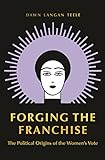Forging the Franchise : The Political Origins of the Women's Vote / Dawn Langan Teele.
Material type: TextPublisher: Princeton, NJ : Princeton University Press, [2018]Copyright date: ©2018Description: 1 online resource (240 p.)Content type:
TextPublisher: Princeton, NJ : Princeton University Press, [2018]Copyright date: ©2018Description: 1 online resource (240 p.)Content type: - 9780691184272
- Women -- Political activity
- Women -- Suffrage -- History
- POLITICAL SCIENCE / Civics & Citizenship
- Arthur Henderson
- Catholicism
- France
- Gilded Age
- Representation of the People Act
- United Kingdom
- United States
- World War I
- class politics
- democratization
- electoral competition
- electoral influence
- electoral reform
- female voters
- male democratization
- multi-party cabinet
- political change
- political emancipation
- political geography
- political inclusion
- religious cleavage
- suffrage movement
- suffrage movements
- suffrage
- suffragists
- voting rights
- wartime cabinet
- women's enfranchisement
- women's suffrage
- women
- online - DeGruyter
| Item type | Current library | Call number | URL | Status | Notes | Barcode | |
|---|---|---|---|---|---|---|---|
 eBook
eBook
|
Biblioteca "Angelicum" Pont. Univ. S.Tommaso d'Aquino Nuvola online | online - DeGruyter (Browse shelf(Opens below)) | Online access | Not for loan (Accesso limitato) | Accesso per gli utenti autorizzati / Access for authorized users | (dgr)9780691184272 |
Browsing Biblioteca "Angelicum" Pont. Univ. S.Tommaso d'Aquino shelves, Shelving location: Nuvola online Close shelf browser (Hides shelf browser)

|

|

|

|

|

|

|
||
| online - DeGruyter Secret Wars : Covert Conflict in International Politics / | online - DeGruyter Three Stones Make a Wall : The Story of Archaeology / | online - DeGruyter Theology and the Scientific Imagination : From the Middle Ages to the Seventeenth Century, Second Edition / | online - DeGruyter Forging the Franchise : The Political Origins of the Women's Vote / | online - DeGruyter The Hard Facts of the Grimms' Fairy Tales : Expanded Edition / | online - DeGruyter Dark Commerce : How a New Illicit Economy Is Threatening Our Future / | online - DeGruyter Origins of the Kabbalah : Not Assigned / |
Frontmatter -- Contents -- List of Figures and Tables -- Preface -- Introduction -- Democratization and the Case of Women -- Strategic Mobilization for Suffrage in Great Britain -- Remember the Ladies: Competition and Mobilization in the United States -- The "Clerical Peril" and Radical Opposition to Female Voters in France -- Conclusion -- Appendix -- References -- Index
restricted access online access with authorization star
http://purl.org/coar/access_right/c_16ec
The important political motivations behind why women finally won the right to voteIn the 1880s, women were barred from voting in all national-level elections, but by 1920 they were going to the polls in nearly thirty countries. What caused this massive change? Why did male politicians agree to extend voting rights to women? Contrary to conventional wisdom, it was not because of progressive ideas about women or suffragists' pluck. In most countries, elected politicians fiercely resisted enfranchising women, preferring to extend such rights only when it seemed electorally prudent and in fact necessary to do so. Through a careful examination of the tumultuous path to women's political inclusion in the United States, France, and the United Kingdom, Forging the Franchise demonstrates that the formation of a broad movement across social divides, and strategic alliances with political parties in competitive electoral conditions, provided the leverage that ultimately transformed women into voters.As Dawn Teele shows, in competitive environments, politicians had incentives to seek out new sources of electoral influence. A broad-based suffrage movement could reinforce those incentives by providing information about women's preferences, and an infrastructure with which to mobilize future female voters. At the same time that politicians wanted to enfranchise women who were likely to support their party, suffragists also wanted to enfranchise women whose political preferences were similar to theirs. In contexts where political rifts were too deep, suffragists who were in favor of the vote in principle mobilized against their own political emancipation.Exploring tensions between elected leaders and suffragists and the uncertainty surrounding women as an electoral group, Forging the Franchise sheds new light on the strategic reasons behind women's enfranchisement.
Mode of access: Internet via World Wide Web.
In English.
Description based on online resource; title from PDF title page (publisher's Web site, viewed 27. Sep 2021)


